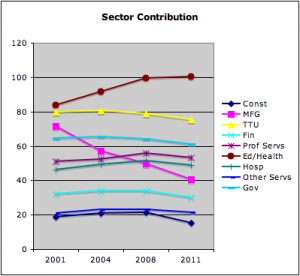 From the very beginning, the Occupy movement has been one surprise after another. The scale of the turnout in lower Manhattan is said to have stunned the AdBusters crew. The scale of peripheral support that came to the major protests surprised the activist core. The scale of the police response surprised the major media that wanted to ignore the story. And the speed with which the movement swept across the country surprised everyone.
From the very beginning, the Occupy movement has been one surprise after another. The scale of the turnout in lower Manhattan is said to have stunned the AdBusters crew. The scale of peripheral support that came to the major protests surprised the activist core. The scale of the police response surprised the major media that wanted to ignore the story. And the speed with which the movement swept across the country surprised everyone.
But more than anything, the biggest surprise has been the movement’s staying power. Despite virtually all the US encampments being raided or voluntarily abandoned, the movement continues to offer up – you guessed it – surprises.
Occupy the SEC
Last weeks’ 325-page letter to the SEC et al from an Occupy Wall Street working group that supports the Volcker Rule portion of Dodd-Frank, came as a shock to the financial community. This was no rambling left wing polemic (such as you might be reading now), but a carefully considered expression of the broad ranging benefits of controls on the largest institutions. It was the kind of thing that could only be constructed by people who come from inside those large financial institutions.
To decode, this was Wall Street occupying Wall Street. Well and truly the 5th Column.
Surely, it is dawning on even the most strident radical capitalist that it is in their own self-interest to come to grips with the basics of this movement. It’s one thing when left wing radicals are talking about income inequality. It’s something else altogether different when it’s a major topic at the World Economic Forum in Davos!
This doesn’t need to make sense; only fiction needs to make sense. It is what it is, and I am very pleasantly surprised.
Reestablishing Solidarity
As the winter weather kept many people indoors and away from Occupy actions, I’ve become a bit concerned that the potentially fractious nature of hardcore activist collaborations would create an atmosphere that might discourage or alienate the large mass of peripheral supporters like me. While it’s true that I haven’t seen much evidence of this, I also haven’t seen much evidence of the opposite.
For this reason, I’ve suggested to every Occupier I know that it would be helpful to us on the periphery if Occupy created a series of regular, low-risk protests scheduled at such a time and constructed in such a way that so-called “regular people” could feel safe in coming out and showing solidarity with the core of the movement. The model that I keep pointing to is the regular Monday night protests held in 1989 in Berlin on both sides of the Berlin Wall.
Don’t Screw This Up
I’ve heard from many in and around the core of the movement their concern about some issues and ideas taking precedent over others. If that line of thinking becomes prevalent, this movement will fail.
To be sure, it is crucial that the movement remain open to and aware of ALL the various viewpoints, issues, communities, etc. that make up this remarkable collection. But it is equally crucial that ALL these communities recognize that is the solidarity among themselves that attracts the large mass of peripheral supporters. And it is that large mass on the periphery that will force the change – NOT the hardcore at the center. The relationship is symbiotic; the periphery needs the center and vice versa.
To succeed – that means radically altering the dialog, awakening the apathetic and driving for real change – this movement can’t let itself get ripped apart. Everything needs to be focused on maintaining solidarity and attracting supporters.
Solidarity is the Goal
I’ve spent the last 30 years wondering what the hell was wrong with people in the US. Didn’t they see where this country was heading? Didn’t they understand that we couldn’t just keep growing on leverage without it eventually biting us in the ass? Didn’t they see that we were becoming an empire with our military spread far and wide? Didn’t they see that this nation was rapidly driving itself deep into the “bad guys of history” category?
Surprisingly, Occupy has shown that many more people than I had thought do seem to understand.
So don’t let us down, Occupy. We don’t want to go down on the wrong side of history. You are our last, best chance to pull the US back from the brink of catastrophe.
If we blow it now, we won’t get another opportunity like this in our lifetime.






